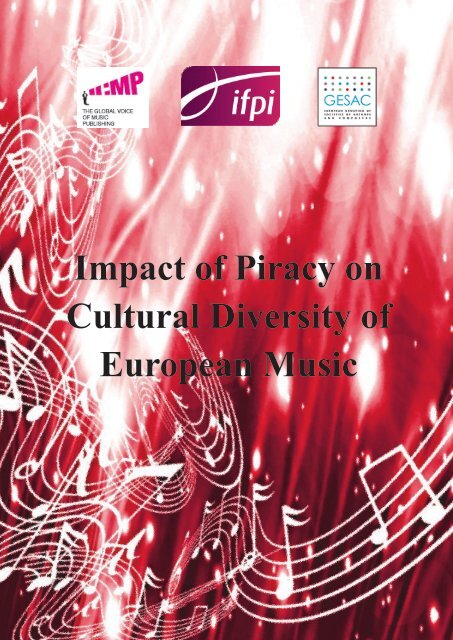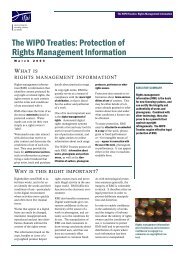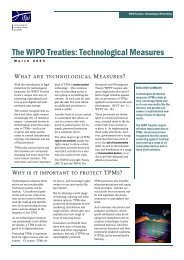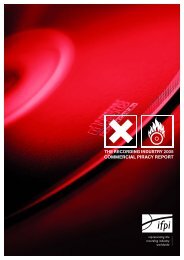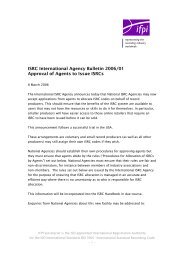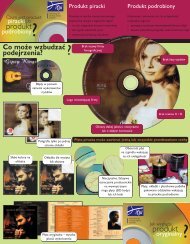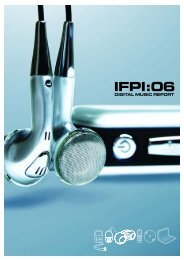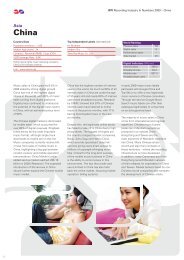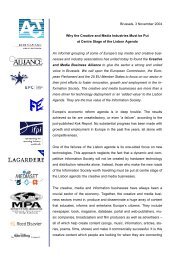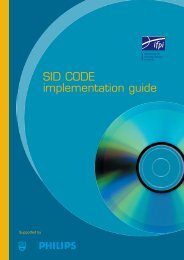Impact of Piracy on Cultural Diversity of European Music - IFPI
Impact of Piracy on Cultural Diversity of European Music - IFPI
Impact of Piracy on Cultural Diversity of European Music - IFPI
Create successful ePaper yourself
Turn your PDF publications into a flip-book with our unique Google optimized e-Paper software.
<str<strong>on</strong>g>Impact</str<strong>on</strong>g> <str<strong>on</strong>g>of</str<strong>on</strong>g> <str<strong>on</strong>g>Piracy</str<strong>on</strong>g> <strong>on</strong><br />
<strong>Cultural</strong> <strong>Diversity</strong> <str<strong>on</strong>g>of</str<strong>on</strong>g><br />
<strong>European</strong> <strong>Music</strong>
Much has been written about the ec<strong>on</strong>omic impact <str<strong>on</strong>g>of</str<strong>on</strong>g> piracy in<br />
Europe, with studies showing that high levels <str<strong>on</strong>g>of</str<strong>on</strong>g> <strong>on</strong>line<br />
infringement have led to dwindling revenues and job losses<br />
across the creative sector. Just as important, however, is the<br />
effect this is having <strong>on</strong> the cultural diversity <str<strong>on</strong>g>of</str<strong>on</strong>g> Europe’s music<br />
sector, and the threat that it poses to a vibrant future for<br />
musical <str<strong>on</strong>g>of</str<strong>on</strong>g>ferings representing different cultures and languages<br />
and appealing to niche markets.<br />
Markets in most EU Member States have been devastated by falling sales and the<br />
c<strong>on</strong>sequent reduced investment in new music and artists. In 2000, for example, artists <str<strong>on</strong>g>of</str<strong>on</strong>g> 15<br />
different nati<strong>on</strong>alities sold more than <strong>on</strong>e milli<strong>on</strong> copies <str<strong>on</strong>g>of</str<strong>on</strong>g> their albums across Europe. By<br />
2010, this figure had almost halved to eight.<br />
Today a huge variety <str<strong>on</strong>g>of</str<strong>on</strong>g> music is still released throughout Europe and the rest <str<strong>on</strong>g>of</str<strong>on</strong>g> the world,<br />
ranging across numerous genres and originating in many different countries. Local<br />
repertoire remains extremely important to c<strong>on</strong>sumers in virtually all markets. For the record<br />
industry, domestic repertoire in 2010 accounted for more than half <str<strong>on</strong>g>of</str<strong>on</strong>g> physical format sales<br />
in France (58%), Denmark (57%), Greece (53%), Italy (52%), Czech Republic (51%) and<br />
Finland (51%), as well as a significant proporti<strong>on</strong> in Sweden (49%), Hungary (38%), the UK<br />
(38%), Spain (37%), Portugal (35%) and Germany (32%).<br />
Yet this diversity is being undermined by digital piracy — the easy availability <str<strong>on</strong>g>of</str<strong>on</strong>g> unlicensed<br />
free digital copies. Businesses have less m<strong>on</strong>ey available to invest and are less willing to<br />
take risks <strong>on</strong> music with a narrow potential audience. English language repertoire has the<br />
broadest potential market and is therefore increasingly comparatively attractive to investors<br />
in a world where many local markets are devastated by piracy. Just three albums in the<br />
global Top 50 <str<strong>on</strong>g>of</str<strong>on</strong>g> 2010 c<strong>on</strong>tained n<strong>on</strong>-English language repertoire and no n<strong>on</strong>-English titles<br />
featured in the Top 30.<br />
Most artists require a lot <str<strong>on</strong>g>of</str<strong>on</strong>g> upfr<strong>on</strong>t support and investment to build a scalable career in the<br />
music industry. They require financial support in the form <str<strong>on</strong>g>of</str<strong>on</strong>g> an advance payment, so that<br />
they can c<strong>on</strong>centrate <strong>on</strong> writing, rehearsing and performing their music. They also require<br />
assistance to make sound recordings, music videos and stage live shows. Industry figures<br />
estimate it <str<strong>on</strong>g>of</str<strong>on</strong>g>ten takes US$1 milli<strong>on</strong> to break an artist to the top <str<strong>on</strong>g>of</str<strong>on</strong>g> the charts in a major<br />
market.<br />
This support for artists can <strong>on</strong>ly c<strong>on</strong>tinue if investors<br />
have a fair chance to make a return <strong>on</strong> their outlay. The<br />
music industry is highly risky, with <strong>on</strong>ly an estimated<br />
<strong>on</strong>e in five artists making a commercial return <strong>on</strong> the<br />
m<strong>on</strong>ey invested in them. Declining revenues from both<br />
record sales and live performances in 2010 raise the<br />
prospect <str<strong>on</strong>g>of</str<strong>on</strong>g> fewer artists securing upfr<strong>on</strong>t investment in<br />
the future.<br />
3
Financial investment in s<strong>on</strong>gwriting and composing talent by music publishers is also very<br />
substantial — UK publishers al<strong>on</strong>e invested more than £100 milli<strong>on</strong> in 2010. In additi<strong>on</strong> to<br />
A&R costs, and the advances paid to sign new writers and composers, publishers provide<br />
financial support in a variety <str<strong>on</strong>g>of</str<strong>on</strong>g> other areas — the promoti<strong>on</strong> <str<strong>on</strong>g>of</str<strong>on</strong>g> live showcases, studio time,<br />
the producti<strong>on</strong> <str<strong>on</strong>g>of</str<strong>on</strong>g> recordings, and the manufacture <str<strong>on</strong>g>of</str<strong>on</strong>g> performance materials (scores and<br />
parts). As regards the traditi<strong>on</strong>al business <str<strong>on</strong>g>of</str<strong>on</strong>g> music publishing — the publicati<strong>on</strong> and<br />
distributi<strong>on</strong> <str<strong>on</strong>g>of</str<strong>on</strong>g> sheet music — publishers have been making printed music (including<br />
tablature) available <strong>on</strong>line since the mid-1990s, but again this business has great difficulty<br />
competing with the piratical free. The substantial investments by authors’ societies in<br />
promoting local culture throughout the EU are also put at risk.<br />
Spain is a music market that has been particularly devastated by digital piracy. Research by<br />
Nielsen (2010) reveals that 45 per cent <str<strong>on</strong>g>of</str<strong>on</strong>g> active internet users in Spain regularly use<br />
services that distribute unlicensed music, compared to an average <str<strong>on</strong>g>of</str<strong>on</strong>g> 23 per cent across the<br />
top five markets in the EU. <strong>Music</strong> sales in the country fell by 55 per cent between 2005 and<br />
2010, well above the global average. In 2010 al<strong>on</strong>e, the market declined by 21 per cent.<br />
Local artists, in particular new acts, have been the principal<br />
victims <str<strong>on</strong>g>of</str<strong>on</strong>g> the crisis. The strength <str<strong>on</strong>g>of</str<strong>on</strong>g> Spanish repertoire in<br />
the past made Julio Iglesias, Alejandro Sanz, Enrique<br />
Iglesias, Miguel Bosé, Mónica Naranjo, La Oreja De Van<br />
Gogh, Estopa, Jarabe de Palo and David Bisbal internati<strong>on</strong>al<br />
stars. Until 2004, at least <strong>on</strong>e Spanish act would sell more<br />
than <strong>on</strong>e milli<strong>on</strong> album copies across Europe every year. In<br />
2007, Alex Ubago reached that mark, but no other Spanish<br />
act has reached it since then. In the past two years, not a single new Spanish artist has even<br />
featured in the country’s Top 50 chart, compared with 10 in 2003. Sales <str<strong>on</strong>g>of</str<strong>on</strong>g> local artists have<br />
suffered more than those <str<strong>on</strong>g>of</str<strong>on</strong>g> internati<strong>on</strong>al acts. The proporti<strong>on</strong> <str<strong>on</strong>g>of</str<strong>on</strong>g> the market accounted for by<br />
local artist sales has shrunk to around 40 per cent, nearly half the estimated share in 2004.<br />
Over the past five years, Spain has lost a number <str<strong>on</strong>g>of</str<strong>on</strong>g> wholesalers and specialty music shops,<br />
including well-known names such as Madrid Rock, Discoplay, Castello and others. These<br />
businesses combined accounted for around 20 per cent <str<strong>on</strong>g>of</str<strong>on</strong>g> the retail sector in Spain. Today,<br />
the Spanish physical retail sector is dominated by supermarkets and chains, such as<br />
Carrefour and El Corte Inglés, which are able to rely <strong>on</strong> a diversified income stream and tend<br />
to <str<strong>on</strong>g>of</str<strong>on</strong>g>fer the most popular mainstream products. Specialty shops for music have all but<br />
disappeared.<br />
The decline in music sales has impacted <strong>on</strong> the health <str<strong>on</strong>g>of</str<strong>on</strong>g> all genres,<br />
but it is the smaller, niche genres that have suffered the most. For<br />
sound recordings, the reducti<strong>on</strong> in physical retail space across<br />
Europe has led to a significant reducti<strong>on</strong> in sales <str<strong>on</strong>g>of</str<strong>on</strong>g> niche genres.<br />
4
Independent music stores used to be the main sources <str<strong>on</strong>g>of</str<strong>on</strong>g> specialised recordings, but recent<br />
years have seen the mass closure <str<strong>on</strong>g>of</str<strong>on</strong>g> independent and specialty music shops. In some<br />
markets they have all but disappeared.<br />
Larger stores, under pressure given tighter margins,<br />
have shifted to stocking products such as games and<br />
DVDs in place <str<strong>on</strong>g>of</str<strong>on</strong>g> music c<strong>on</strong>tent. Only major chart<br />
releases make it <strong>on</strong>to stores’ shelves. The significant<br />
reducti<strong>on</strong> in retail shelf space for niche products has<br />
greatly impacted the ability for this type <str<strong>on</strong>g>of</str<strong>on</strong>g> music to<br />
reach the public.<br />
Figures from <strong>Music</strong> & Copyright reveal that sales <str<strong>on</strong>g>of</str<strong>on</strong>g><br />
classical music recordings declined by 42 per cent globally between 2000 and 2009,<br />
compared with a fall <str<strong>on</strong>g>of</str<strong>on</strong>g> just 22 per cent in the sales <str<strong>on</strong>g>of</str<strong>on</strong>g> rock music. Jazz sales declined by 41<br />
per cent in value over the same period.<br />
Research by Nielsen has shown that the number <str<strong>on</strong>g>of</str<strong>on</strong>g> record stores in Italy fell from 1,430 in<br />
1999 to just 540 by 2009, a reducti<strong>on</strong> <str<strong>on</strong>g>of</str<strong>on</strong>g> 62 per cent. This figure was closely matched by a<br />
68 per cent fall in physical format sales. In the UK, the number <str<strong>on</strong>g>of</str<strong>on</strong>g> specialist music stores<br />
fell by 63 per cent between 2003 and 2009 (Millward Brown).<br />
The impact <strong>on</strong> niche genres is nowhere more evident than in the classical sector, where<br />
orchestras and opera companies are struggling to survive. While touring is an important<br />
source <str<strong>on</strong>g>of</str<strong>on</strong>g> revenue, sessi<strong>on</strong> recording fees and<br />
commercial recordings also c<strong>on</strong>tribute to the health <str<strong>on</strong>g>of</str<strong>on</strong>g><br />
the sector.<br />
Ross Pople, creative director <str<strong>on</strong>g>of</str<strong>on</strong>g> the L<strong>on</strong>d<strong>on</strong> Festival<br />
Orchestra, told the Daily Telegraph in April 2010:<br />
―Orchestras go out <str<strong>on</strong>g>of</str<strong>on</strong>g> business quite easily because their<br />
margins are very, very tight – particularly the smaller<br />
orchestras. Europe has a number <str<strong>on</strong>g>of</str<strong>on</strong>g> chamber orchestras,<br />
which is what we are, and they have incredibly tight<br />
margins. There is not much m<strong>on</strong>ey but it is a very<br />
serious and dedicated group <str<strong>on</strong>g>of</str<strong>on</strong>g> musicians who keep it alive. So keeping them alive is also a<br />
resp<strong>on</strong>sibility.‖<br />
Examples <str<strong>on</strong>g>of</str<strong>on</strong>g> orchestras and opera companies around the world struggling to make ends meet<br />
abound. The US is a leading indicator <str<strong>on</strong>g>of</str<strong>on</strong>g> the sector as orchestras and opera companies are<br />
more commercial than in Europe, with less state support—and figures there show that many<br />
are closing, facing bankruptcy, or adopting drastic cuts. However, as EU countries hit<br />
budget issues, similar effects are bound to occur in Europe. Already the Scottish Opera, <strong>on</strong>e<br />
<str<strong>on</strong>g>of</str<strong>on</strong>g> the jewels in the crown <str<strong>on</strong>g>of</str<strong>on</strong>g> Scottish culture, is struggling as its musicians start looking for<br />
part-time jobs such as cleaning and waitressing to supplement their income.<br />
5
It is obviously more difficult for artists and s<strong>on</strong>gwriters to attract investment in a market that<br />
is saturated by high levels <str<strong>on</strong>g>of</str<strong>on</strong>g> piracy. There are signs, however, that if acti<strong>on</strong> is taken to curb<br />
<strong>on</strong>line piracy then a virtuous cycle <str<strong>on</strong>g>of</str<strong>on</strong>g> investment can be restarted.<br />
In South Korea, where the government adopted str<strong>on</strong>g legislati<strong>on</strong> to curb the unlicensed<br />
distributi<strong>on</strong> <str<strong>on</strong>g>of</str<strong>on</strong>g> music, rising sales have led to renewed investment in local talent, ranging<br />
from K-Pop stars to Myung-Whun Chung, the principal c<strong>on</strong>ductor <str<strong>on</strong>g>of</str<strong>on</strong>g> the Seoul Philharm<strong>on</strong>ic<br />
Orchestra. The number <str<strong>on</strong>g>of</str<strong>on</strong>g> new acts signed has increased, <str<strong>on</strong>g>of</str<strong>on</strong>g>fering c<strong>on</strong>sumers more choice <str<strong>on</strong>g>of</str<strong>on</strong>g><br />
local music and giving these artists a platform to build their careers not just in South Korea,<br />
but across Asia.<br />
By taking acti<strong>on</strong> to ensure the rule <str<strong>on</strong>g>of</str<strong>on</strong>g> law is respected <strong>on</strong> the internet, the South Korean<br />
government created an envir<strong>on</strong>ment in which investment in music was stimulated, resulting<br />
in an expansi<strong>on</strong> <str<strong>on</strong>g>of</str<strong>on</strong>g> c<strong>on</strong>sumer choice and more artists enjoying the opportunity to pursue a<br />
career in music.<br />
6
ICMP<br />
ICMP is the world trade associati<strong>on</strong> representing the interests <str<strong>on</strong>g>of</str<strong>on</strong>g> the music publishing<br />
community internati<strong>on</strong>ally. ICMP members are music publisher associati<strong>on</strong>s from Europe,<br />
North and South America, the Middle East, Africa and Asia-Pacific.<br />
www.icmp-ciem.org<br />
<strong>IFPI</strong><br />
<strong>IFPI</strong> is the trade associati<strong>on</strong> representing the recording industry worldwide, with a<br />
membership comprising some 1400 record companies in 65 countries and affiliated industry<br />
associati<strong>on</strong>s in 46 countries.<br />
www.ifpi.org<br />
GESAC<br />
The <strong>European</strong> Grouping <str<strong>on</strong>g>of</str<strong>on</strong>g> Societies <str<strong>on</strong>g>of</str<strong>on</strong>g> Authors and Composers (GESAC) represents 34 <str<strong>on</strong>g>of</str<strong>on</strong>g><br />
the main copyright collective management societies (authors’ societies) in the <strong>European</strong><br />
Uni<strong>on</strong>, Norway and Switzerland, administering the rights and remunerati<strong>on</strong> <str<strong>on</strong>g>of</str<strong>on</strong>g> almost<br />
700,000 authors, composers and writers in a variety <str<strong>on</strong>g>of</str<strong>on</strong>g> sectors (music, audiovisual, literary,<br />
visual and graphic arts) as well as music publishers.<br />
www.gesac.org<br />
Published January 2012<br />
7
All photos credit <str<strong>on</strong>g>of</str<strong>on</strong>g> Fotolia 8


